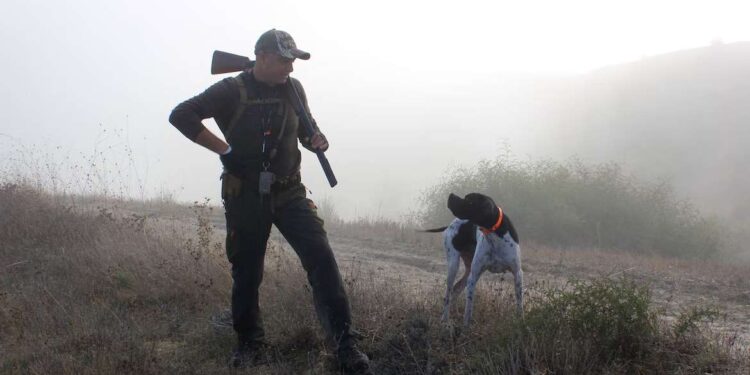Hunting with dogs has been a traditional pastime for many centuries, dating back to the time of ancient hunters and their canine companions. The art of hunting with dogs is an enjoyable experience that can provide you with hours of fun in the great outdoors.
Not only does it bring out your inner hunter, but it also allows you to bond more deeply with your trusty canine companion. Let’s explore everything you need to know about canine-assisted hunting so that you can make the most out of this exciting activity.
Selecting the Right Dog for Hunting
When looking for a suitable canine companion, you will want to consider a few key factors such as size, temperament, and trainability. Size matters when selecting a hunting dog because it affects the type of game one can pursue; smaller breeds are usually better suited for small game such as rabbits, while larger breeds may be able to take on bigger prey such as wild boar or deer.
The temperament of the dog is also important; some dogs are naturally more at ease in hunting environments than others and are more likely to pay attention to their owners’ commands during a hunt.
Finally, the trainability of a dog is essential; the better trained a dog is, the more successful it will be in helping you with your hunting endeavors.
Once you have decided on the type of breed that best suits your needs, you should select one from a reputable breeder who has raised and socialized their puppies to become great hunting dogs. This will help you avoid any problems that may arise from having a poorly trained or overly aggressive dog.
It is important to take your time with the selection process and be sure to bring the dog home for a few test runs before committing to taking it out into the wild. This will allow you to get an idea of how well-suited it is for hunting.
Reading Suggestion: Teacup Micro Bully
Training a Hunting Dog
In order to effectively train a hunting dog, it is important to use positive reinforcement techniques. Dogs need consistent and clear commands that they can understand and respond to quickly. Rewarding successful responses with treats or praise will create a stronger bond between the owner and the dog, as well as help reinforce desired behaviors.
Training should begin with basic obedience commands, such as sit and stay, and then progress to more complex commands, such as casting. Teaching the dog to recognize specific hand signals or words for different tasks will help them understand what is expected of them in hunting situations.
It is important to expose your hunting dog to a variety of terrain and environments so that they can become accustomed to the sights, sounds, and smells of hunting.
Shooting during hunting causes loud noises that can scare your pup and make it unresponsive to commands or less likely to stay by your side. To prevent this from happening, it is essential to expose your dog to shooting sounds in a controlled environment prior to the hunt. Buy a bulk of ammo for training purposes and have fun several times to simulate shooting with real noise before the real hunt.
One of the best ways to prepare your dog for the hunting lifestyle, and get them used to all the sounds and experiences, is to use airsoft. Airsoft guns are designed to be real-life-looking replicas of rifles, and you can use an airsoft gun for weekend fun whilst training your dog to be the best possible hunting companion.
This will help the pup become accustomed to the loud noises and recognize them as a normal part of the hunting experience. It’s important to train your pup for the environment they will be hunting in. This means teaching them to recognize different smells, sights, and sounds common in their hunting area such as quail calls or deer scents.
You should also make sure your pup is comfortable with navigating different terrain, from dense brush to wide-open spaces. Finally, it is essential to provide the dog with plenty of exercise and playtime in order to keep them fit and healthy for a successful day in the field.
Reading Suggestion: Why Schnauzers Are The Worst Dogs?
Safety Considerations When Hunting with Dogs
When hunting with dogs, there are a few safety considerations to keep in mind. Dogs should always be kept on a leash when outdoors and never allowed to wander off or run away. Hunters need to be aware of their surroundings and the locations of other people, animals, and potential hazards.
Hunters should also ensure that all firearms are handled safely and kept away from dogs. To help ensure safety, individuals may benefit from undertaking a few Advanced Firearms Training courses to ensure they know exactly how to handle a weapon correctly and avoid negligent discharges. It is also important to practice basic first-aid techniques in case of an emergency and take a first-aid kit with you on your hunt.
Finally, hunters should always be aware of the weather conditions and make sure their dog has plenty of water and warm shelter when necessary.
Coon Hunting With Dogs
Common Mistakes in Canine Assisted Hunting
Canine-assisted hunting is a great way to enjoy the outdoors and have a successful hunt. However, there are some common mistakes that can be made when it comes to hunting with dogs. Here are some of the most common mistakes made by hunters:
Not Conditioning Your Dog For Hunting
It’s important to condition your dog for hunting trips by introducing them to the sights and sounds of a hunt. You should also have consistent training sessions with your dog so that they are prepared for any situation on the hunt.
Not Following Standard Safety Protocols
Hunting can be dangerous, especially when you add dogs into the equation. Make sure to follow all safety protocols, including always having a leash on your dog and keeping them away from any other animals or people in the area.
Not checking the regulations of the hunting grounds
Different areas have different rules and regulations regarding canine-assisted hunting. Be sure to check with local authorities before taking your dog out to hunt in order to ensure that you are following the correct regulations.
Not Monitoring Your Dog’s Behavior
Dogs can become excited during a hunt, which can lead to them roaming too far away from you or getting into dangerous situations. Monitor your dog’s behavior and be sure to give them breaks when needed so that they don’t overheat or become too exhausted.
Not Understanding Your Dog’s Capabilities
Every dog is different and they have different levels of ability when it comes to hunting. Make sure to understand your own dog’s strengths and weaknesses so that you can plan accordingly for a successful hunt. By avoiding these common mistakes, you can ensure that your canine-assisted hunting trips are enjoyable and successful.
Final Word
Hunting with dogs is a rewarding and enjoyable experience that can bring you closer to nature. With the right training, your canine companion will be an invaluable asset in any hunting expedition.
Using the tips outlined in this guide, you should now have all of the necessary knowledge needed to properly train your dog for successful hunting trips. While it does take some time and effort on your part, getting out into nature with your beloved pup makes every second worth it! So what are you waiting for? Grab a leash and start teaching those commands today!









